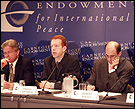Registration
Thank you!
You will receive an email confirming your registration.
Click on panelist name for audio.
Thomas Carothers, Senior Associate, Democracy & Rule of Law Project, Carnegie Endowment, moderator
Patrick Clawson, Deputy Director, Washington Institute for Near East Policy;
Joshua Muravchik, Resident Scholar, American Enterprise Institute;
Robert Malley, Middle East Program Director, International Crisis Group;
Marina Ottaway, Senior Associate, Democracy & Rule of Law Project, Carnegie Endowment.
